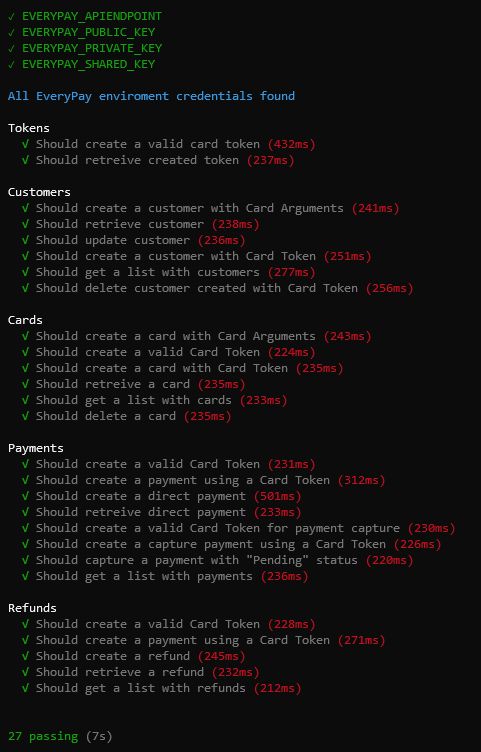This is an UNOFFICIAL Javascript ES6 library for binding EveryPay payments gateway REST API. By using this software you agree that the author has no responsibility of any issues, bugs, malfunctions or side-effects that may occur by using any piece of code included in this library.
This library is for server side usage. You must NEVER use or expose Private Key in client side. The only functions that can be used in client side using a Public Key, are when you need to create / retreive a token using createToken / retreiveToken.
Minimum requirement of NodeJS 10. It can also be compiled using Babel or directly use in React Native. It utilizes the fetch Web API and uses window.fetch for Web, global.fetch for React Native, node-fetch for NodeJS or fallback if there is no native fetch support.
You can find full API Documentation and Testing instructions.
NPM:
npm install @lytrax/everypay --save
Yarn:
yarn add @lytrax/everypay
Use environment variables to setup your gateway account credentials. There is an .env.example file you can check and copy. You can use dotenv package to auto load project root .env files. The library expects the following environment variables to be present:
EVERYPAY_APIENDPOINT="https://sandbox-api.everypay.gr"
EVERYPAY_PUBLIC_KEY="pk_..."
EVERYPAY_PRIVATE_KEY="sk_..."
EVERYPAY_SHARED_KEY="sh_..."For Firebase, you can use Firebase CLI to set environment configuration:
firebase functions:config:set \
everypay_sandbox_public_key="pk_..." \
everypay_sandbox_private_key="sk_..." \
everypay_sandbox_shared_key="sh_..."
and then use functions config to initialize node process environment variables:
process.env['EVERYPAY_APIENDPOINT'] = 'https://sandbox-api.everypay.gr';
process.env['EVERYPAY_PUBLIC_KEY'] = functions.config().everypay_sandbox_public_key;
process.env['EVERYPAY_PRIVATE_KEY'] = functions.config().everypay_sandbox_private_key;
process.env['EVERYPAY_SHARED_KEY'] = functions.config().everypay_sandbox_shared_key;Every function returns a Promise that can be either success with a result or fail with an error. When it fails, if the error contains an endPointError property, then that reflects an error at the gateway endpoint. You can find the endpoint error structure at the EveryPay API Reference Errors.
Every function can take an optional custom endpoint URL and/or endpoint key to use. When these parameters are omitted, default environment variables are used for all keys and endpoint URL. This can be usefull when creating tokens at the client and we receive the public key dynamically:
createToken({
// Will use EVERYPAY_APIENDPOINT environment variable when omitted
endPointURL: 'https://api.everypay.gr',
// Will use EVERYPAY_PUBLIC_KEY environment variable when omitted
endPointKey: 'pk_...',
...
})const { createToken } = require('@lytrax/everypay/Tokens');
// Or ES6 import
// import { createToken } from '@lytrax/everypay/Tokens';
// This should be called at the client
createToken({
card_number: '5217925525906273',
expiration_year: '2022',
expiration_month: '05',
cvv: '343',
holder_name: 'John Doe'
})
.then((token) => {
// Success: Store or use the token
// ...
})
.catch((error) => {
if ('endPointError' in error) {
// Handle EveryPay API error
} else {
// Handle other code error
}
});const { createCustomer } = require('@lytrax/everypay/Customers');
// Or ES6 import
// import { createCustomer } from '@lytrax/everypay/Customers';
async function myFlow({
tokenId: token,
customerDescription: description,
customerName: full_name,
customerEmail: email
}) {
try {
const customer = await createCustomer({
token,
description,
full_name,
email
});
// Success: Use the customer object
// ...
} catch (error) {
if ('endPointError' in error) {
// Handle EveryPay API error
} else {
// Handle other code error
}
}
}All API bindings are fully tested:
MIT License
Copyright (c) Christos Lytras <christos.lytras@gmail.com> (lytrax.io)
Permission is hereby granted, free of charge, to any person obtaining a copy of this software and associated documentation files (the "Software"), to deal in the Software without restriction, including without limitation the rights to use, copy, modify, merge, publish, distribute, sublicense, and/or sell copies of the Software, and to permit persons to whom the Software is furnished to do so, subject to the following conditions:
The above copyright notice and this permission notice shall be included in all copies or substantial portions of the Software.
THE SOFTWARE IS PROVIDED "AS IS", WITHOUT WARRANTY OF ANY KIND, EXPRESS OR IMPLIED, INCLUDING BUT NOT LIMITED TO THE WARRANTIES OF MERCHANTABILITY, FITNESS FOR A PARTICULAR PURPOSE AND NONINFRINGEMENT. IN NO EVENT SHALL THE AUTHORS OR COPYRIGHT HOLDERS BE LIABLE FOR ANY CLAIM, DAMAGES OR OTHER LIABILITY, WHETHER IN AN ACTION OF CONTRACT, TORT OR OTHERWISE, ARISING FROM, OUT OF OR IN CONNECTION WITH THE SOFTWARE OR THE USE OR OTHER DEALINGS IN THE SOFTWARE.
